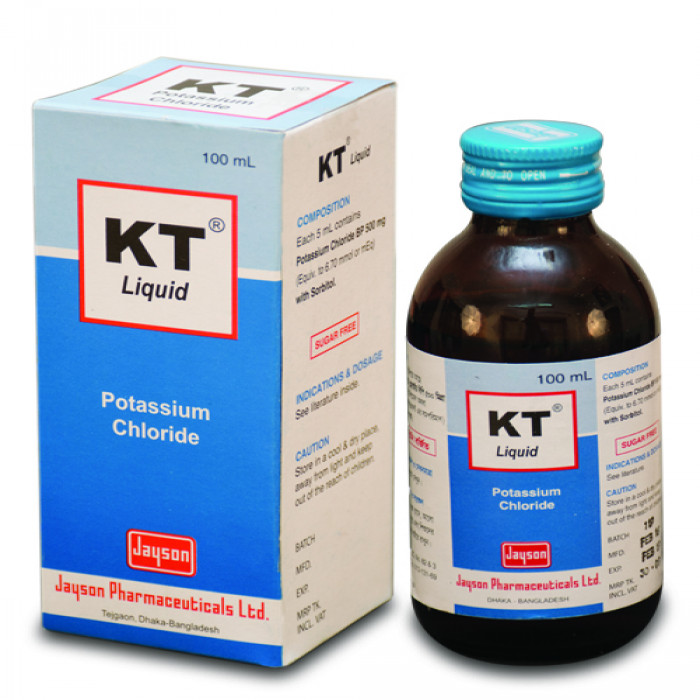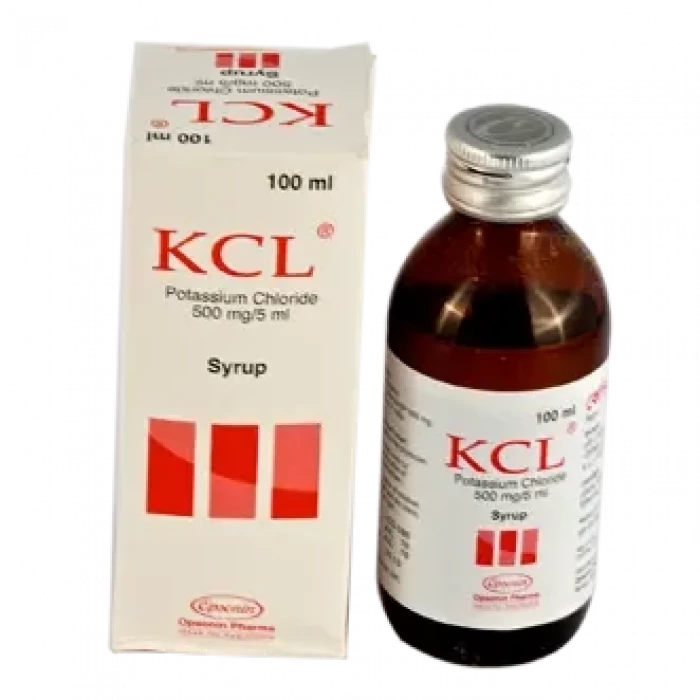
✔ 100% Authentic Product
👁️ Currently Viewing 4637
Potassium Chloride is indicated in drug-induced hypokalemia, liver cirrhosis, nausea, vomiting, cholera, diarrhea, muscular weakness, paralysis, cardiac and congestive heart failure, diabetic ketoacidosis, ulcerative colitis, weakness, anorexia, drowsiness, Cushing’s syndrome, pyloric stenosis, low blood pressure, etc.
Discount
Price: ৳ 31
MRP:
৳
30.9
1%
Off

100% Genuine Products, Guaranteed

Safe & Secure Payments, Always

Fast, Secure & Efficient Delivery

Proper Packaging
 Cash on Delivery - All over Bangladesh
Cash on Delivery - All over Bangladesh Regular Delivery - 12-24 Hours, Dhaka City* Charge Tk.39-59
Regular Delivery - 12-24 Hours, Dhaka City* Charge Tk.39-59 Regular Delivery - 24-48 Hours, Other Cities* Charge Tk.99-110
Regular Delivery - 24-48 Hours, Other Cities* Charge Tk.99-110
🌙 রমযান অফার 🌙
 ফ্রি ডেলিভারিঃ - ৭৯৯ টাকা+ অর্ডারে, ঢাকা
শহরে
ফ্রি ডেলিভারিঃ - ৭৯৯ টাকা+ অর্ডারে, ঢাকা
শহরে ফ্রি ডেলিভারিঃ - ২৭৯৯ টাকা+ অর্ডারে, ঢাকার
বাহিরে
ফ্রি ডেলিভারিঃ - ২৭৯৯ টাকা+ অর্ডারে, ঢাকার
বাহিরে
📲 মোবাইল অ্যাপ অর্ডারে সাশ্রয় বেশী
-
Google Play Store থেকে ডাউনলোড
-
Apple Store থেকে ডাউনলোড
100% Genuine Products, Guaranteed
Safe & Secure Payments, Always
Fast, Secure & Efficient Delivery
Proper Packaging
 Cash on Delivery - All over Bangladesh
Cash on Delivery - All over Bangladesh Regular Delivery - 12-24 Hours, Dhaka City* Charge Tk.39-59
Regular Delivery - 12-24 Hours, Dhaka City* Charge Tk.39-59 Regular Delivery - 24-48 Hours, Other Cities* Charge Tk.99-110
Regular Delivery - 24-48 Hours, Other Cities* Charge Tk.99-110 ফ্রি ডেলিভারিঃ - ৭৯৯ টাকা+ অর্ডারে, ঢাকা
শহরে
ফ্রি ডেলিভারিঃ - ৭৯৯ টাকা+ অর্ডারে, ঢাকা
শহরে ফ্রি ডেলিভারিঃ - ২৭৯৯ টাকা+ অর্ডারে, ঢাকার
বাহিরে
ফ্রি ডেলিভারিঃ - ২৭৯৯ টাকা+ অর্ডারে, ঢাকার
বাহিরে- Google Play Store থেকে ডাউনলোড
- Apple Store থেকে ডাউনলোড
🌙 রমযান অফার 🌙
📲 মোবাইল অ্যাপ অর্ডারে সাশ্রয় বেশী
✅ Description:
KT Liquid is a medication that contains 1.5g of Potassium Chloride in every 15ml dosage. This amount of Potassium Chloride is approximately equal to 20 milliequivalents of Potassium. Potassium is an essential mineral that plays several important roles in the body.
One of the key functions of potassium is its involvement in the formation of cells and the development of nerves throughout the body. It also plays a crucial role in muscle contraction and helps maintain proper kidney function. Additionally, potassium contributes to maintaining a healthy pH balance in the body.
KT Liquid is typically taken in doses. It can be taken with or without food, but it is generally recommended to take it after a meal. Following the instructions provided by the healthcare professional or indicated on the medication's packaging is important to ensure proper dosage and administration.
It's worth noting that specific dosing instructions may vary depending on the individual's condition and the healthcare professional's guidance. It's always advisable to consult with a healthcare professional or pharmacist for accurate information and personalized recommendations regarding the use of KT Liquid or any other medication.
Safety Advices

Alcohol
CONSULT YOUR DOCTOR
It is not known whether it is safe to consume alcohol with KT Liquid. Please consult your doctor.

Pregnancy
CONSULT YOUR DOCTOR
KT Liquid may be unsafe to use during pregnancy. Although there are limited studies in humans, animal studies have shown harmful effects on the developing baby. Your doctor will weigh the benefits and any potential risks before prescribing it to you. Please consult your doctor.

Breastfeeding
CONSULT YOUR DOCTOR
KT Liquid is safe to use during breastfeeding. Human studies suggest that the drug does not pass into the breastmilk in a significant amount and is not harmful to the baby.

Driving
CAUTION
KT Liquid does not usually affect your ability to drive.

Kidney
CAUTION
KT Liquid should be used with caution in patients with kidney disease. A dose adjustment of KT Liquid may be needed. Please consult your doctor.

Liver
CONSULT YOUR DOCTOR
There is limited information available on the use of KT Liquid in patients with liver disease. Please consult your doctor.
✔️ Uses of KT Liquid
- Treatment of Potassium deficiency
✔️ How to use KT Liquid
- Take this medicine in the dose and duration as advised by your doctor.
- Check the label for directions before use.
- Measure it with a measuring cup and take it by mouth.
- Shake well before use.
- KT Liquid is to be taken with food.
✔️ Side Effects of KT Liquid
- Diarrhea
- Nausea
- Vomiting
- Flatulence
- Abdominal pain
- Fatigue
- Febrile response
✔️ Pharmacology
- Potplus Syrup is used to prevent or treat low blood levels of potassium (hypokalemia).
- May cause gastrointestinal irritation if administered undiluted. Increased dilution of the solution and taking it with meals may reduce gastrointestinal irritation.
- You may need to get your blood test done while you are taking Potplus Syrup to monitor the level of potassium in your body.
- Inform your doctor if you have a history of kidney disease, heart problems, high blood pressure, severe dehydration, or diarrhea for a long time.
- Inform your doctor if you are pregnant or breastfeeding.
✔️ Indication of KT Liquid
KT Liquid is a medication used to treat potassium insufficiency. It is prescribed to individuals whose dietary control with potassium-rich foods is insufficient. Potassium is a necessary vitamin for the body that aids in the maintenance of healthy health.
✔️ Pharmacology
Potassium chloride is a major cation of the intracellular fluid. It plays an active role in the conduction of nerve impulses in the heart, brain, and skeletal muscle; contraction of cardiac skeletal and smooth muscles; maintenance of normal renal function, acid-base balance, carbohydrate metabolism, and gastric secretion.
✔️ Dosage & Administration of KT Liquid
Oral:
- Adults: The initial dose for adults with seizure disorders should not exceed 1.5 mg/day divided into three doses. Dosage may be increased in increments of 0.5 to 1 mg every 3 days until seizures are adequately controlled or until side effects preclude any further increase. Maintenance dosage must be individualized for each patient depending upon response. The maximum recommended daily dose is 20 mg.
- The initial dose for adults with panic disorder is 0.25 mg given in two divided doses. An increase to the target dose for most patients of 1 mg/day may be made after 3 days.
- Pediatric Patients: In order to minimize drowsiness, the initial dose for infants and children (up to 10 years of age or 30 kg of body weight) should be between 0.01 and 0.03 mg/kg/day but not exceed 0.05 mg/kg/day given in two or three divided doses.
✔️ Interaction
The concurrent use of certain medications and treatments can increase the risk of hyperkalemia (high potassium levels). Here are some examples of medications and treatments that can increase the likelihood of hyperkalemia when used in combination:
- Angiotensin-converting enzyme (ACE) inhibitors: These medications, used to treat conditions such as high blood pressure and heart failure, can reduce aldosterone production and impair potassium excretion, leading to increased potassium levels.
- Cyclosporin: This immunosuppressive medication, often used in organ transplant recipients, can interfere with renal potassium excretion and contribute to hyperkalemia.
- Nonsteroidal anti-inflammatory drugs (NSAIDs): NSAIDs, including drugs such as ibuprofen and naproxen, can disrupt renal potassium excretion, potentially leading to hyperkalemia.
- Beta-blockers: Beta-blockers, commonly prescribed for conditions like high blood pressure and heart disease, can decrease heart rate and impair the release of renin, which can result in reduced aldosterone levels and elevated potassium levels.
- Heparin: Heparin, an anticoagulant medication, can increase potassium levels by interfering with the movement of potassium in and out of cells.
- Digoxin: Digoxin, a medication used to treat heart conditions, can affect the balance of electrolytes, including potassium, and increase the risk of hyperkalemia.
- Potassium-sparing diuretics: These diuretic medications, such as spironolactone and amiloride, can reduce potassium excretion, leading to higher potassium levels.
✔️ Contraindications
- Hyperkalemic periodic paralysis: This is a condition characterized by episodes of muscle weakness or paralysis accompanied by high levels of potassium in the blood (hyperkalemia). In individuals with this condition, potassium administration can exacerbate symptoms and should be avoided.
- Inherited para myotonia: It is a genetic disorder that causes muscle stiffness and weakness. Similar to hyperkalemic periodic paralysis, potassium administration can worsen symptoms and is contraindicated.
- Severe renal failure: When renal function is severely impaired, potassium levels may already be elevated. In such cases, additional potassium administration can lead to hyperkalemia and should be avoided.
- Untreated Addison's disease: Addison's disease is characterized by adrenal insufficiency, leading to low levels of cortisol and aldosterone. This condition can be associated with hyperkalemia, and potassium administration can further increase potassium levels.
- Hyporeninemic hypoaldosteronism: This is a condition characterized by reduced production of renin and aldosterone by the kidneys. It can lead to hyperkalemia, and potassium administration should be avoided in these cases.
- Acute dehydration: In situations of severe dehydration, potassium levels may be elevated due to reduced kidney function. Potassium administration can worsen hyperkalemia and is contraindicated.
- Conditions involving extensive cell destruction: In situations such as severe burns or other conditions that result in significant cell damage, potassium can be released into the bloodstream, leading to hyperkalemia. In such cases, additional potassium administration should be avoided.
✔️ Pregnancy & Lactation
It is generally recommended that pregnant women avoid taking medications during the first trimester, as this is a critical period of fetal development. However, the use of medications during pregnancy should always be carefully considered, and the potential risks and benefits should be evaluated in consultation with a healthcare professional.
As for breastfeeding while taking potassium salts, there are no specific contraindications. Potassium salts, such as potassium chloride, are often used to manage certain medical conditions, and they are generally considered safe for use while breastfeeding. The amount of potassium transferred to breast milk is usually minimal and unlikely to cause any significant effects on the nursing infant.
Nevertheless, it is important to discuss any medications, including potassium salts, with a healthcare professional when breastfeeding. They can provide personalized advice based on your specific situation, taking into account the potential risks and benefits.
Overall, it is crucial to consult with a healthcare professional for guidance on medication use during pregnancy and while breastfeeding to ensure the well-being of both the mother and the baby.
✔️ Precautions & Warnings
Caution should be exercised when administering potassium salts to patients with renal or adrenocortical insufficiency, cardiac disease, acute dehydration, heat spasms, extensive tissue damage as seen in severe burns, or to patients taking potassium-sparing diuretics. Excessive use of potassium-containing salt substitutes or concurrent use of potassium supplements may result in potassium accumulation, especially in patients with renal insufficiency. It is important to consider the simultaneous use of other medications that either contain potassium or have the potential to cause hyperkalemia. Treatment should be discontinued if severe nausea, vomiting, or abdominal discomfort occurs.
✔️ Storage Conditions
Store below 25° C in a cold, dry, and light-protected location.
⚠️Disclaimer:
At ePharma, we’re committed to providing accurate and accessible health information. However, all content is intended for informational purposes only and should not replace medical advice from a qualified physician. Please consult your healthcare provider for personalized guidance. We aim to support, not substitute, the doctor-patient relationship.









